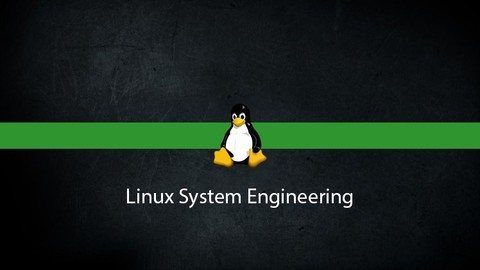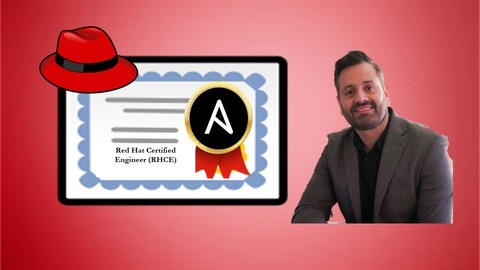The Red Hat Certified Engineer (RHCE) certification is a highly respected credential in the IT world, demonstrating expertise in managing and maintaining Linux systems.
Earning your RHCE not only validates your skills but also opens doors to a wide range of career opportunities in system administration, DevOps, and cloud computing.
By mastering the concepts covered in the RHCE curriculum, you’ll be equipped to handle complex tasks such as system configuration, security management, and automation, making you a valuable asset to any organization.
With the increasing demand for skilled Linux professionals, finding a comprehensive and effective RHCE course is crucial for your success.
You’re likely looking for a course that covers all the exam objectives, provides hands-on labs, and is taught by experienced instructors who can guide you through the intricacies of Red Hat Enterprise Linux.
Choosing the right course can be a daunting task, with numerous options available online.
Based on our research and analysis, the best overall RHCE course on Udemy is the RHCE Linux System Engineer Complete Course.
This course offers a comprehensive and practical approach to mastering the skills required for the RHCE exam.
It covers a wide range of topics, from basic system administration to advanced concepts like network configuration and security, providing you with a solid foundation for success.
The hands-on labs and real-world examples ensure you gain practical experience and can confidently apply your knowledge in a real-world setting.
While the RHCE Linux System Engineer Complete Course is our top recommendation, we understand that you might have specific needs and preferences.
Therefore, we’ve compiled a list of other excellent RHCE courses on Udemy that cater to various learning styles and goals.
Keep reading to explore these options and find the perfect course to help you achieve your RHCE certification.
RHCE Linux System Engineer Complete Course
This RHCE Linux System Engineer Complete Course equips you with the skills to manage and maintain Linux systems.
You start with Kerberos Authentication, learning to secure systems using KDC Admin Server and Client Authentication techniques.
The course then dives into file-sharing protocols such as NFS and SMB.
You will configure NFSv4 features, utilize Samba Server for group collaboration, and gain experience setting up SELinux settings.
You even explore integrating Kerberos with NFS.
You then move on to advanced networking concepts like NetworkManager, Static Routes, and Network Teaming.
You learn to create resilient networks with Network Bridging, master IPv6 configuration, and understand Firewalld to configure robust security rules using NAT and Port Forwarding.
You will also learn how to configure DNS servers.
The course then introduces Apache Web Server.
You will create simple websites, manage Virtual Host configurations, secure private directories, deploy CGI applications, and learn about TLS Security to configure secure connections for your website.
Next, you explore iSCSI SAN Storage and learn to configure iSCSI Target and connect iSCSI Initiator.
You also learn to configure Mail Servers using Postfix and manage SSH using key-based authentication and many other SSH options.
The course then introduces MariaDB, teaching you to install, create databases, write SQL queries, and perform backup and restoration.
You will also learn about NTP (Network Time Protocol) and set up peer systems for time synchronization.
Finally, you explore shell scripting, using variables, conditions, and loops.
You will also learn about logging and monitoring using tools like rsyslogd and journald and familiarize yourself with the Sysctl Utility to manage system parameters.
Linux Red Hat Certified Engineer (RHCE - EX294)
This RHCE course is perfect if you know some Linux and want to become a Red Hat Certified Engineer.
You will learn how to use Ansible to automate those tedious, everyday Linux system administration tasks.
Ansible is essential for today’s IT world, and this course will teach you how to use it to manage configurations like a pro.
The course starts with the basics of Ansible: what it is, why it is useful, and the important terms you need to know.
You’ll set up your own lab environment using either Oracle VirtualBox or AWS Cloud, install Ansible on a Linux system, and then get your hands dirty writing your first Ansible playbooks.
Don’t worry; you will learn how to write playbooks to manage files, configure systems, install and start services, and connect to remote clients.
You’ll even learn about Ansible roles, which are reusable components that will make your life easier by letting you organize your playbooks and share them with your team.
This course will teach you how to use Ansible’s advanced features, like task control with handlers, conditions, and loops, so you can build complex and powerful playbooks.
You will also learn to use Ansible Vault to protect sensitive information by encrypting it.
And, if that weren’t enough, you’ll also be introduced to Ansible AWX and Ansible Tower, more powerful tools that will help you manage and automate at an even larger scale.
You will walk away from this course with the skills and confidence you need to ace the EX294 exam and become a sought-after Linux administrator.
Complete Guide on RHCE-EX294 (RHEL8)-Unofficial
This course prepares you for the Red Hat Certified Engineer (RHCE) exam on Red Hat Enterprise Linux 8 (RHEL8), focusing on Ansible for automation.
You’ll start by building your lab environment, complete with virtual machines, networks, and secure SSH connections.
You’ll then learn about Ansible’s core components, including the Ansible configuration file (ansible.cfg), inventories for managing your systems, and modules for performing specific tasks.
The course teaches you to use Ansible ad-hoc commands for quick tasks and powerful playbooks for automating complex workflows.
You’ll become proficient in writing playbooks using YAML, a human-readable data serialization language, to manage users, files, packages, and firewalls.
As you progress, you’ll explore advanced Ansible features like Jinja2 templating to create dynamic configuration files and Ansible Vault to safeguard sensitive data.
You’ll dive into the power of Jinja2, learning how to use conditional statements and loops to create adaptable playbooks that can handle various scenarios.
You’ll learn to create and deploy Jinja2 templates for efficient system configuration management.
You’ll also learn to use Ansible Roles to organize and reuse your automation code, making your workflows more efficient.
The course guides you through creating your roles, downloading pre-built roles from Ansible Galaxy, and using them to configure services like the Apache Web Server and Chronyd for time synchronization.
Linux EX300 Exam Preparation - Upgrade From EX200
If you’re aiming to become a Red Hat Certified Engineer (RHCE), this course is your pathway to success.
You’ll build upon your existing Linux knowledge from the EX200 exam and gain expertise in advanced concepts needed for the EX300 certification.
The course begins by guiding you through setting up your lab environment, a crucial step in gaining practical experience.
You’ll then delve into system configuration and management, learning to work with network teaming, IPv6, firewalld, and kernel parameters using tools like sysctl.
You’ll master configuring Kerberos for authentication, setting up iSCSI targets, and analyzing system performance to keep your systems running smoothly.
Next, you’ll dive into the world of network services, tackling essential services like HTTP/HTTPS, DNS, NFS, SMB, SMTP, and SSH.
You’ll learn how to install, configure, and secure these services, a vital skill for any Linux administrator.
Imagine being able to configure secure file sharing with NFS, manage user authentication with Kerberos, or troubleshoot DNS issues with ease.
You’ll then explore the realm of database services using MariaDB.
You’ll learn to install, configure, and manage this popular database system, gaining hands-on experience with backups, restores, schema creation, and SQL queries.
Think of the insights you’ll gain by being able to efficiently manage and query databases.
Red Hat Certified Engineer (RHCE) EX294 Exam Advanced Linux
The Advanced Linux Administration course is designed to get you ready for the RHCE EX294 exam.
This course will take you from the basics to mastering advanced Linux administration.
You’ll begin with a strong foundation in Ansible, learning to install, configure, and use it for automation.
You’ll write Ansible playbooks to automate complex tasks, mirroring real-world scenarios you’ll face in the exam and in your career.
The course dives into Ansible modules, dynamic inventory, and how to manage system tasks, deploy applications, and configure network services.
You’ll go beyond the basics and master advanced Linux topics.
You’ll develop skills in managing containers and virtualization, essential for today’s IT environments.
You’ll learn performance optimization and troubleshooting, preparing you to maintain complex Linux systems.
You’ll even explore the latest industry trends, like Red Hat Ansible Automation Platform, and learn to integrate tools like Automation Hub, Splunk, Grafana, and Prometheus.





